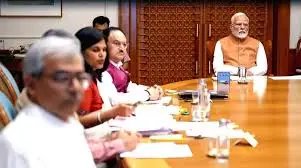Need ‘whole of govt, society’ approach to eliminate TB: PM Modi

Prime Minister Narendra Modi has called for a comprehensive and coordinated approach involving both the government and society to eradicate tuberculosis (TB) in India. During his recent address, Modi emphasized the urgency of tackling the disease. He urged a collaborative effort that includes all stakeholders—governmental agencies, healthcare providers, and the general public—to eliminate TB by 2030.
A Unified Fight Against TB
TB remains a significant public health challenge in India, with the country accounting for a substantial percentage of the global TB burden. Prime Minister Modi pointed out that despite the country’s progress in the fight against TB, a sustained and holistic strategy is needed to decisively end the disease. He stressed the need for a “whole of government, society” approach, which will mobilize resources, awareness, and participation across various sectors of society.
Government Initiatives
The Indian government has already implemented several initiatives aimed at combating TB, including providing free treatment for TB patients, improving access to diagnostics, and running awareness campaigns across the country. Modi highlighted the role of the health ministry and various state governments in ensuring that TB treatment and prevention reach every corner of the nation, including remote rural areas.
In addition to strengthening the healthcare infrastructure, the government is also focusing on expanding digital health solutions that can track and treat TB more effectively. The National TB Elimination Program (NTEP) plays a central role in this vision, setting an ambitious target to eliminate TB by 2025, five years ahead of the global goal of 2030.
The Role of Society
While government action is critical, Modi also acknowledged the crucial role that society must play in achieving TB eradication. The Prime Minister emphasized that communities, families, and local organizations should take an active part in promoting TB awareness and supporting patients undergoing treatment.
Public participation is key to breaking the stigma that often surrounds TB. This stigma can discourage individuals from seeking timely treatment, but Modi called for greater education to dispel myths about TB. Such efforts will encourage those affected by the disease to come forward without fear of discrimination.
Strengthening Partnerships
PM Modi also underlined the importance of partnerships with the private sector, NGOs, and international organizations. These collaborations will strengthen India’s response to TB and enhance the overall capacity to fight the disease. The Prime Minister highlighted that the country needs to unite all resources, whether from within the government or civil society, to ensure that India becomes TB-free.
The integration of innovative healthcare technologies, such as artificial intelligence and data-driven solutions, will play a vital part in India’s TB elimination strategy. The government has actively promoted the use of AI in detecting and treating TB. These efforts will increase the efficiency of healthcare delivery and ensure faster, more accurate diagnoses.
Moving Towards a TB-Free India
India’s ambitious goal of becoming TB-free by 2025 represents a crucial step toward improving public health and reducing the socio-economic impact of the disease. By adopting a “whole of government, society” approach, the country aims to eliminate TB while ensuring that no one is left behind.
The Prime Minister concluded by reiterating the need for continuous awareness, proactive treatment, and social solidarity to completely wipe out tuberculosis from the country. He encouraged every Indian to join the fight against TB, emphasizing that a united effort is the key to success.






